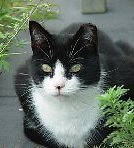Friday, October 16th was National Feral Cat Day! It's a good time for you to learn about feral cats in your neighborhood and how you can help them.
Feral cats (aka: wild, untamed, afraid of humans) as well as friendly strays roam every corner of this country's urban, suburban and rural areas. Everyone has cats in their midst. Some of us just don't see these nocturnal dwellers. But they are out there. And THEY NEED YOUR help.
Not being domesticated and unable to be touched, feral cats are at the root level of the feline overpopulation problem. There are an estimated 45 million feral cats in the United States and they are breeding prolifically. An intact female and her mate can produce 11,000 cats over the course of five years!
Many kind people feed them, but little has been done on a large enough scale to combat the suffering that overpopulation brings.
Here are three things you can to do help feral and stray cats in your area.
1. Feed Them: A plastic tote with holes cut in both sides makes a nicely protected feeding station. Holes at either end provide an escape if another animal comes to eat while someone is already having dinner. It's best to pick up food at dusk so as not to draw other wildlife. In the winter, a heated water bowl (available at larger national pet stores) is necessary for winter watering.

2. Shelter Them: A large styrofoam cooler with a small hole cut into it makes a cozy shelter during the cold winter months. If a cooler can keep drinks cold in summer, it can keep a cat warm in winter. Line the shelter with straw NOT blankets. Straw wicks moisture away from the cat. Never put food in a sleeping shelter.

3. Fix Them: The final step toward caring for your outdoor dwelling cats is to have them spayed or neutered. Local TNR organizations like Carol's Ferals can loan you live traps to help you control the felines you're feeding outside.

Trap-Neuter-Return is the practice of capturing a feral cat in a humane live trap, having it spayed or neutered, then returning it to it's original home and family of cats (called a colony). There are organizations like Carol's Ferals throughout the country who loan out traps and help people with low cost vet services to help free-roaming cats.
If you see a cat with the left ear cut flat like this little guy, it's a free-roaming "FIXED" cat! No need to trap that one!! The practice of ear tipping began many years ago and is the universal symbol that lets us know that those cats have already been fixed.

To get started helping the cats in your part of Grand Rapids, vist me online at CarolsFerals.org
Carol's Ferals is a Grand Rapids, MI based 501c3 non-profit organization dedicated to TNR of all free-roaming cats.
Remember, just because you can't touch them, doesn't mean you can help them!
The Rapidian, a program of the 501(c)3 nonprofit Community Media Center, relies on the community’s support to help cover the cost of training reporters and publishing content.
We need your help.
If each of our readers and content creators who values this community platform help support its creation and maintenance, The Rapidian can continue to educate and facilitate a conversation around issues for years to come.
Please support The Rapidian and make a contribution today.

